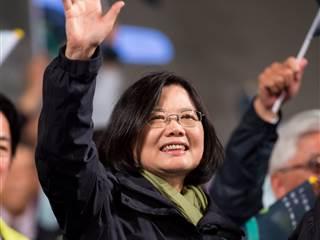Democratic Progressive Party (DPP) presidential candidate Tsai Ing-wen secured yesterday a landslide election victory, unseating the China-friendly Chinese National Party (Kuomintang, KMT) with 56% of the vote.

During a congratulatory call to Tsai Ing-wen, president Ma Ying-jeou said the election is testament to the democratic achievement of Taiwan and its solid constitutional framework. “I expect the new president to continue upholding the current state of the peace and prosperity enjoyed across the Taiwan Strait,” he said.
by
N. Peter Kramer
Taipei, 17 January 2016
Democratic Progressive Party (DPP) presidential candidate Tsai Ing-wen secured yesterday a landslide election victory, unseating the China-friendly Chinese National Party (Kuomintang, KMT) with 56% of the vote. She becomes the nation’s first female president in its 104-year history. President-elect Tsai won 6.9 million votes while her most important opponent, KMT candidate Eric Chu, garnered 3.8 million votes or 31%.
The DPP also won yesterday an absolute majority in the simultaneous elections for the national parliament, the Legislative Yuan, 68 seats of the 113. Important for the new president, because the rule in Taiwan is that not the biggest party in the parliament delivers the government but the party of the president. In Tsai’s case there will be no problem, but the DPP has to wait governing till May 20 when Tsai Ing-wen will be sworn in as the 14th president of the Republic of China (Taiwan’s official name).
The drama for Eric Chu was complete. His party not only lost its majority, from 64 to 35 seats; the KMT-leader lost his own parliamentarian seat in the district New Taipei City, where he is mayor; symbolic for the unprecedented defeat of the Kuomintang. ‘I congratulate Chairwoman Tsai, she is the choice of the Taiwanese people’, said Chu when he conceded defeat and resigned as KMT chairman. ‘I am sorry but the KMT has lost. We didn’t work hard enough. We let you down, he told his supporters. But he urged them not to lose faith in the KMT who, he said, will act a loyal opposition.
During a congratulatory call to Tsai Ing-wen, president Ma Ying-jeou said the election is testament to the democratic achievement of Taiwan and its solid constitutional framework. “I expect the new president to continue upholding the current state of the peace and prosperity enjoyed across the Taiwan Strait,” he said.
In a post-election international news conference, Tsai vowed to strengthen the unity of the country and build a consistent, predictable and sustainable cross-strait relationship. “We will work toward maintaining the status quo for peace and stability across the Taiwan Strait in order to bring the greatest benefits and well-being to the Taiwanese people,” she said. At the moment it is not yet known what the president-elect status quo entails. During the presidential debate Tsai demurred on her stance on the ‘1992 Consensus’. She said she would aim to engage in a new discussion on the content of it with Beijing. But it is far from certain whether Beijing will accept Tsai’s terms. Mainland China’s authorities have repeatedly stressed the importance of continuing cross-strait relations based on the ‘1992 Consensus’, that is, ‘one China, respective interpretations’.
The United States showed already serious concerns after Tsai’s election. Election night, the US State Department issued a statement congratulating the president-elect on her victory, as well as the people of Taiwan for “once again demonstrating the strength of their robust democratic system, which will now undergo another peaceful transition of power.”
Former US Deputy Secretary of State Bill Burns will visit Taiwan ‘to convey US support for Taiwan’s prosperity and Washington’s interest in peace across the Taiwan Strait’. He is announced to arrive the day after the elections. Also announced by the US State Department is the visit to Beijing this week of Deputy Secretary of State Antony Blinken. He will hold talks with Zhang Zhijun, China’s top official responsible for relations with Taiwan.






